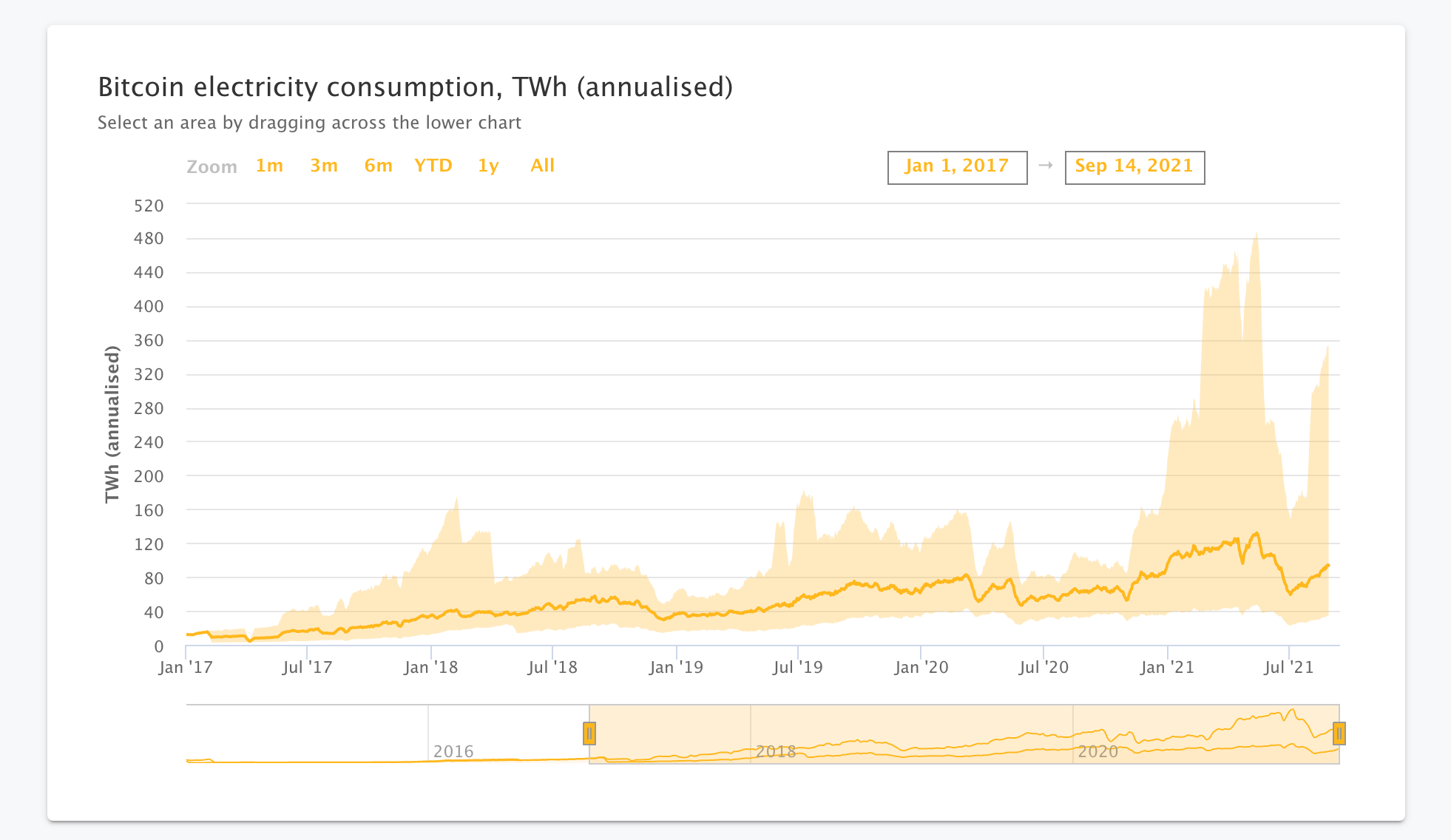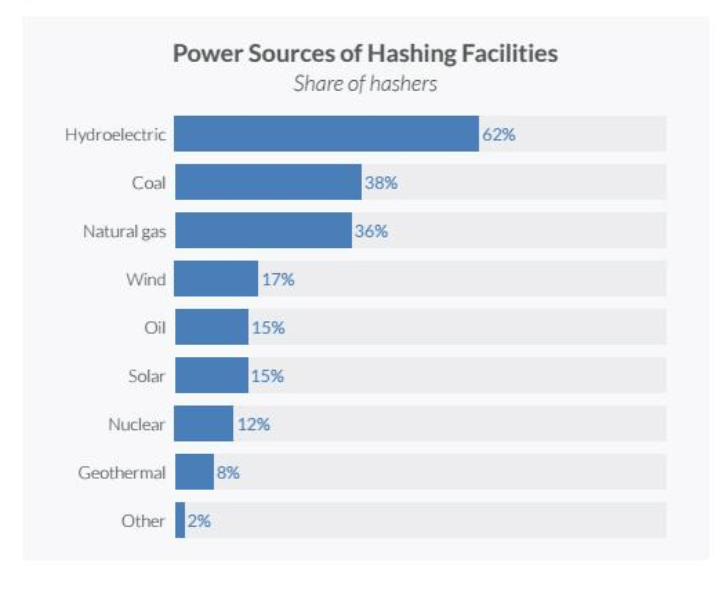Bitcoin mining and its energy consumption is a highly controversial topic and the one most likely used to deter the advancement of the world's only peaceful monetary solution.
More and more tabloid headlines label Bitcoin mining as an energy and environmental disaster.
In addition to the headlines, increasingly offensive political positions have been aimed towards Bitcoin, with the likes of Elizabeth Warren, Janet Yellen, Joe Manchin, and Donald Trump criticizing the currency.

Despite all the negative implications against Bitcoin mining, various researchers, universities and organizations around the world have taken on the task of investigating the energy consumption and environmental impact of this activity.
The results of their findings will be condensed and addressed in this article.
Current narratives on energy consumption are incorrect
On countless occasions the energy consumption of Bitcoin has been compared to the energy consumption of entire countries like Argentina or Sweden.

However, as Lyn Alden, founder of Lyn Alden Investment Strategy, comments, many industries around the world also consume more energy than many countries, such as Google, Amazon, Netflix and Facebook.
Every year news comes out against Bitcoin mining, however the scaremongering tactics of the media and politicians insinuating Bitcoin's energy consumption is destroying our planet, is evident when comparing it to global energy consumption.
According to the Cambridge Center for Alternative Finance (CCAF) of the University of Cambridge, Bitcoin currently consumes less than 100 TWh per year, at the time of writing (August 2021). Currently, the Cambridge Bitcoin Electricity Consumption Index is 87.15 TWh per year.
The University of Cambridge estimated that the highest electricity consumption by Bitcoin, in its entire history, was recorded in May of this year, with an estimated annual value of 132 TWh.

On the other hand, energy consumption worldwide in 2019 was estimated at 173,340 TWh, according to Our World in Data (founded by researchers from the University of Oxford, England).

When comparing the information provided by both organizations, (taking into account the highest energy consumption of Bitcoin registered so far and the energy consumption worldwide in 2019) the energy used by the entire Bitcoin Network represents 0.08% of the world's energy consumption.
And if we compare it with the current energy consumption of Bitcoin (87.15 TW / h), this figure would be at 0.05% of the world's energy consumption.
From the above, it is concluded that the energy consumption of Bitcoin is not as high as mentioned by public figures and various media, but that it is less than 0.1% of all the energy consumed in the world annually.

According to a study from the University of Cambridge from September 2020, more than 100 million people around the world use Bitcoin.
If the number of Bitcoin users were to reach billions of people, researcher Lyn Alden estimates that their energy consumption would still remain below 1%. This is due to the fact that the network's energy usage won’t exceed its long run utility, offered by Bitcoin to its users.
Alden adds that the only serious concern around Bitcoin's energy use is not how much it consumes, but rather the following: “Any serious analyst that understands Bitcoin’s algorithm would actually be more concerned about the possibility of Bitcoin one-day not using enough energy for its security some time in the future when it relies mostly on transaction fees, rather than using too much energy.”
Parker Lewis, Head of Business Development at Unchained Capital, explains that all the energy that Bitcoin consumes is justified, and this is understood once it is understood what is the problem that Bitcoin solves.
As shown above, Bitcoin does not nearly consume enough energy to constitute an "environmental disaster" as many media and public figures claim. Even if this were true, it would not be a problem.
Why? Every watt consumed in Bitcoin is not wasted energy, it is energy that is used to support the best monetary system today, something that many would argue may be one of the most important uses of energy.
Don't agree? Let's take a look at the environmental impact of the world's current monetary system to compare.

When comparing Bitcoin to other monetary systems, in the big picture of things, it uses multitudes less energy than banks, gold mining, and paper money printing.
Are current Bitcoin mining operations dirty?
The most extreme sensational news about the "high" energy consumption of Bitcoin is accompanied by an alleged "environmental destruction", by large amounts of carbon dioxide emitted by bitcoin mining.
However, as PhD Katrina Kelly-Pitou, an expert in energy systems and economic development explains, “Not all types of energy generation are equal in their impact on the environment, nor does the world uniformly rely on the same types of generation across states and markets”.
For instance, 100% of Iceland's energy usage is reliant on renewable energy. Thanks to the country's abundant supply of geothermal and hydropower energy, this would make Bitcoin mining's power demand cheap and nearly irrelevant.

This gets us to the next important thing to note: that high energy consumption does not necessarily imply a high impact on the environment.
In the words of Nic Carter, partner at Castle Island Ventures, “While determining energy consumption is relatively straightforward, you cannot extrapolate the associated carbon emissions without knowing the precise energy mix - that is, the makeup of different energy sources used by the computers mining Bitcoin. For example, one unit of hydro energy will have much less environmental impact than the same unit of coal-powered energy.”
So instead of discussing the energy consumption of Bitcoin, the point of discussion should be the energy sources that are used to supply electricity to the mining operation centers.
How does Bitcoin mining incentivize green energy?
Bitcoin does not waste energy, Bitcoin capitalizes on wasted energy.
This is because Bitcoin, beyond encouraging a specific type of energy, rather encourages the use of abundant, cheap and wasted energy.
A considerable part of Bitcoin mining is powered by stranded and wasted energy.
Mike Colyer, CEO of a mining equipment company Foundry explains, “Miners around the world are looking for stranded power that is renewable. That will always be your lowest cost. Net-net this will be a big win for bitcoin’s carbon footprint.”

As a portable industry, Bitcoin miners have a chance other industries don't: move to remote and inaccessible areas where the power source is so abundant that it exceeds local demand and no one else is using it.
An example of this is the production of electricity from hydroelectric plants: being abundant it is also very economical, making it convenient for Bitcoin miners.
For this reason, this form of renewable energy has been used to mine bitcoins, and it is not that Bitcoin consumes energy that could otherwise be used to give electricity to a country. The fact is that before the miners arrived, that energy was being wasted.

Aldyn additionally highlights that the calculation of the energy consumption of Bitcoin with respect to the global energy consumption, “it’s a rounding error”. This is because Bitcoin miners are consumers of energy resources that no other industry takes advantage of.
Author of the Bitcoin Standard, Saifedean Ammous, explains, "Bitcoin will not 'consume most of our energy'. Energy is not a finite resource we're about to run out of. Energy is a product we produce, and bitcoin is providing a huge economic incentive for producing more energy, and in particular, cheaper energy."
The Bitcoin Mining Council reiterated this point last July with research showing that Bitcoin mining currently uses 0.4% of the total energy wasted in the world.
In this way, Bitcoin miners become innovative end users at the point of energy production. Otherwise, this energy could be lost due to lack of technology for its storage or because it cannot be transported to other places, either because it is impractical or very expensive.
A notable example of this has been Bitcoin mining in areas of China where hydroelectric potential is abundant.

Another notable way that Bitcoin mining takes advantage of waste is through the use of natural gas, which is primarily methane. This fossil fuel is considered "relatively clean" compared to coal and other fossils for energy production, according to the U. S. Energy Information Administration (EIA), since it produces fewer pollutant emissions.
Excess natural gas from oil extraction is usually burned for safety reasons in the plants because there is no other way to take advantage of it and transporting it would be expensive.
According to the EIA, industries burn the gas on site transforming methane into carbon dioxide instead of releasing it directly as methane into the atmosphere, as this would be much more polluting.
However, the burning is also harmful to the environment: “In areas where natural gas is produced at oil wells but is not economical to transport for sale or contains high concentrations of hydrogen sulfide (a toxic gas), it is burned (flared) at well sites. Natural gas flaring produces CO2, carbon monoxide, sulfur dioxide, nitrogen oxides, and many other compounds, depending on the chemical composition of the natural gas and on how well the natural gas burns in the flare”.
When Bitcoin miners use natural gas that is released from oil, they are not just taking advantage of waste, they are isntead trapping an air pollutant and turning it into wealth.
This is probably a more than obvious way that Bitcoin is an environmentally friendly system.
Basically, Bitcoin miners have become storage for this non-renewable energy source that is otherwise lost and that, if expelled into the environment, would increase the level of pollution.
Will Reese, one of the founders of Highwire Energy Partners, pointed out, "I think that’s one of the kind of the beauties of Bitcoin, that the network itself can monetize energy that we just can't get to market can’t use efficiently right now." Like Reese's company, several other companies, including oil companies such as Equinor, have plans to mine BTC with natural gas, or are already doing so.
What percentage of all mining is green?
The electricity powering Bitcoin mining equipment around the world comes from a variety of energy sources, including fossil fuels, which has been undoubtedly been essential to humanity's technological advancement and development.
Various investigations have reported that Bitcoin miners use energy combinations, which include both non-renewable and renewable sources, where the most used is renewable.
In December 2019, the firm CoinShares Research shared the results of their study “The Bitcoin Mining Network: Trends, Average Creation Costs, Electricity Consumption and Sources”.
In the paper, the researchers concluded the following:
“We show that Bitcoin mining is mainly located in global regions where there are ample supplies of renewable electricity available. And finally, we calculate an estimate of the renewables penetration in the energy mix powering the Bitcoin mining network at 73%, making Bitcoin mining more renewables-driven than almost every other large-scale industry in the world.
On the other hand, according to the 3rd Global Cryptoasset Benchmarking Study of the University of Cambridge, from September 2020, in which Bitcoin mining companies from 59 countries participated, 62% of the miners affirmed that they used hydroelectric power as part of their energy mix, and about 80% said they used renewable energy sources to mine bitcoins.

The University report noted that the most common source among Bitcoin miners is renewable: "Hydropower is listed as the number one source of energy, with 62% of surveyed hashers indicating that their mining operations are powered by hydroelectric energy".
The report also mentions that “Other types of clean energies (e.g. wind and solar) rank further down, behind coal and natural gas, which respectively account for 38% and 36% of respondents’ power sources”. The results are shown below:

Additionally, in July of 2021, the Bitcoin Mining Council reported that 56% of Bitcoin miners use energy from sustainable sources.
This organization made up of 23 mining companies in the United States, which concentrate 32% of the computing power on the network, stated that 67.6% of its members use a mix of sustainable energy as primary energy, and inferred that. In the case of global mining, this percentage is 56%.

The Bitcoin Mining Council also presented that Bitcoin mining "is rapidly becoming more efficient, and is powered by a higher mix of sustainable energy than any major country or industry".
Does Proof-of-Stake solve the energy debate?

The Proof of Work (PoW) algorithm is the mechanism that is used in Bitcoin for mining. This system requires each participant or miner to contribute processing power to solve a hash function.
To do this, Bitcoin requires energy to feed the entities that are responsible for performing such iterative operations until a solution to the function is found.
Once a miner has found the solution, they propose a block full of transactions to the network. This block is verified by full nodes to avoid double spending and in return, the miner will receive a reward in the form of newly created BTC.
In case the miner tries to attack the network, it is exposed to rejection by the consensus of the full nodes.
This is how Bitcoin security works: avoiding unwanted behavior because the one who loses the most will be the miner who tries to break the rules.
Proof of Work makes a computer attack against Bitcoin practically unviable. In fact, with a hashrate of almost 126,000 PH / s, it costs almost two million dollars to attack Bitcoin for just one hour, and in that time only 6 blocks could be rewritten, when the chain has nearly 700,000 blocks.
However, PoW alone does not secure a network in every way.
The Nakamoto Consensus, currently the only solution that exists to the Byzantine Generals Problem, is what makes it possible for independent participants in a computer network to function on the basis of consensus, and thus dispense with reliance on a central authority.
Since its inception, Bitcoin has managed to operate uninterruptedly, securely, without any hacks. Among the voices that attack Proof of Work for its energy consumption, the use of Proof-of-Stake (PoS) has been offered as a solution.
Despite being more "energy efficient", PoS naturally centralizes a network by electing stakeholders of the cryptocurrency to validate transactions.
Through a lottery process, holders of the currency need to stake their tokens to participate. The more tokens you stake, the higher chances you win the lottery and validate a block.
This PoS system naturally favors entities with a higher amount of tokens, incentivizing centralization via wealth concentration, creating a plutocracy. The cryptocurrency Ethereum is currently shifting from a PoW system to a PoS and many concerns has been raised over the future fairness of this system.

In the case of PoW and Bitcoin, it does not matter how many bitcoins you have. Just by running a full Bitcoin node, you are able to validate transactions, thus maintaining a system without trust and increasingly trending towards greater decentralization.
Final thoughts
For all the above, it can be concluded that Bitcoin mining does not consume as much energy as those who try to ban Bitcoin or Proof of Work often argue. Current research results allow us to liberally estimate that it is below 0.1% of world energy consumption.
Also, as Lyn Alden mentions, current calculations are rounding errors, since the miners largely use energy that no one else uses, which is abundant, cheap and, stranded.
In addition to the fact that energy consumption is not significant, it is incorrect to make a directly proportional relationship with the impact on the environment.
Not all energy sources have the same environmental impact and Bitcoin miners use energy combinations. Such combinations include renewable sources, hydroelectric being the one that is most present.
Bitcoin miners also feed on electricity produced from natural gas, making it an innovative option for companies that have no alternative but to burn natural gas. Thus, Bitcoin mining shows that it contributes to the environment by capturing an atmospheric pollutant to produce wealth.
The energy consumption of Bitcoin is justified by the problem that this system solves and all that it implies for humanity.
Bitcoin is the only alternative that we have in the face of money issued without limits and without centralized control by central authorities. In the face of the devaluation of salaries, savings, time, and work of citizens. In the face of the destruction of the quality of life. In the face of the violent monetary colonialism that exist around the world: Bitcoin offers a solution.
Simply put, with Bitcoin, each person can control and protect their money from breaches of trust.
To achieve this, Bitcoin does not need wars and blood, it only needs consensus and energy. And that, instead of a problem, is a peaceful solution. An environmentally friendly solution.


 9 minute read
9 minute read